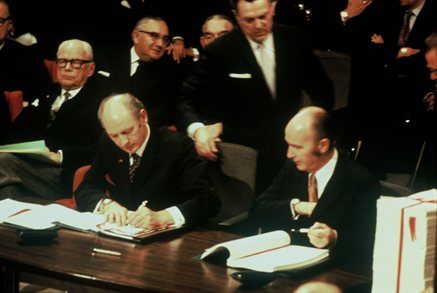Posted on 28 June 2013
The Irish Presidency of the Council of the European Union draws to a close with the mantle being handed over to Lithuania on 1st July 2013. Celebrating the 40th anniversary of Ireland’s accession to the European Economic Community (EEC) in 1973 it is timely to reflect on the historic event and the archival sources documenting this first enlargement of the EEC.

On 1st January 1973, Denmark, the United Kingdom along with Ireland adhered to the Common Market after more than a decade of negotiations and false starts. The membership of the three was the EEC’s first enlargement from six to nine members and in the years that followed many other countries elected to apply for membership.
Various events have been organised to commemorate this important date in Ireland’s history both in Ireland and indeed in the European institutions in Brussels. A fascinating insight into the journey undertaken by Ireland before being accepted into Europe is charted in an exhibition organised by the National Archives of Ireland and the Royal Irish Academy.
The Historical Archives of the European Union (HAEU) in Florence, keeper of the official papers from the EU institutions, preserves the records which document the complex decade-long political, diplomatic, and economic story that brought the three countries into the EEC on 1 January 1973.
In the papers of the European Commission there is a significant amount of files concerning the preparation of the negotiations, problems relating to enlargement, difficulties to be encountered during the transition period, the preferential UK/Ireland trade agreements, the Community position, and structural adaptation.
In the European Parliament files a considerable number of reports, Commission and plenary minutes and recommendations on the state of the negotiations are found.
The Council of Ministers is currently preparing for transfer to the HAEU the files on the first enlargement with the papers of the Ministerial, Deputy and Working Party meetings as well as related subject files. These official papers will be available to research by the end of 2013 and prove of immense value in regard to the historical research on the first enlargement and in particular on Ireland’s entry.
The HAEU also holds the private collections of numerous high-ranking European officials which contain interesting archival material on the negotiations and eventual accession of Ireland, the United Kingdom and Denmark. The collections of Edoardo Martino (European Commissioner), Emile Noël (First Secretary General of the European Commission), Franco Maria Malfatti (President of the Commission) and the SGCICEE (Secrétariat Général du Comité interministériel pour les questions de coopération économique européenne) stand out in particular with statements by Jack Lynch, Ireland’s Prime Minister at the time and by the then Irish Foreign Minister, Patrick Hillery, a champion of a united Europe.
In the abovementioned collections along with reference to Ireland’s membership bid there is also information on both Britain and Denmark’s applications. In the private papers of Uwe Kitzinger and Noël Salter deposited at the HAEU there are files on Britain’s accession to the Community.
To understand Ireland’s current attitude to the move towards giving greater powers to the EU in the political sphere, one must understand what was behind Ireland’s application for EEC membership and what happened in the intervening period.
The main items on the agenda for the Irish tenure of the EU presidency in the first six months of 2013 were employment and social reforms, securing economic stability, digital skills, entrepreneurship and EU-US trade talks. While the objectives of the EU are considerably different today than in the 1960’s and 1970’s, there is a common thread which is economic growth.
Link to Exhibition
Link to HAEU Holdings